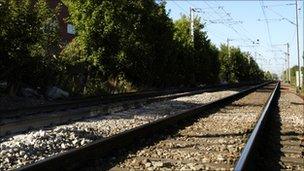Scrap metal theft: Laws in the age of 'Steptoe and son'
- Published

The UK's laws on scrap metal are still in the age of Steptoe and Son, a Tory former cabinet minister has said.
Lord Jenkin called for police to be given more powers to shut down traders selling stolen scrap metal at a House of Lords debate on the issue.
He was responding to Labour's Lord Faulkner of Worcester who said the crime cost £770m last year.
The Home Office said it recognised the "urgency" of the problem and was seeing if the law needed to be changed.
Lord Jenkin, the former environment secretary, told peers at question time in the House of Lords: "We are still legally in the age of Steptoe and Son, and it really is time to bring the legislation up to date."
He added that the police needed "stronger powers to intervene to close down illicit scrap merchants who trade in stolen property and make absolutely no effort to discover where it has come from."
Liberal Democrat Lord Tope, a councillor in the London Borough of Sutton, told the House that 14 brass memorial plaques were stolen from Carshalton war memorial last week and said a local church had its bell stolen.
"This is the sort of everyday occurrence which is being experienced all over the country," he said.
'Cashless' transactions
Lord Faulkner said the problem was getting worse because of the rise in the price of scrap metal and described the current legislation, the Scrap Metal Dealers Act 1964, as "out of date".
"I doubt whether there are many members of this House whose trains have not been delayed as the result of the theft of signalling cable, which is adding thousands of hours of delay to train schedules," he said.
Lord Faulkner added that the law should be changed so that there was an increase in penalties which would eliminate the "payment of cash as a means of settling transactions and moves to a system of licensing in place of the registration that exists at present."
Home Office minister Lord Henley said the department was working with other government areas to identify whether any legislative changes were needed to tackle metal theft, including "the possibility of moving to a cashless model," he said.
That was a model which is used in "almost every other European country including Bulgaria" said the Bishop of London, the Rt Rev Richard Chartres, who added that lead theft from church roofs cost £26m a year.
The debate also saw calls for a legal requirement for scrap metal dealers to be put onto a register and for details of people selling scrap metal to be checked.
- Published28 September 2011
- Published26 September 2011
- Published2 September 2011
- Published26 August 2011